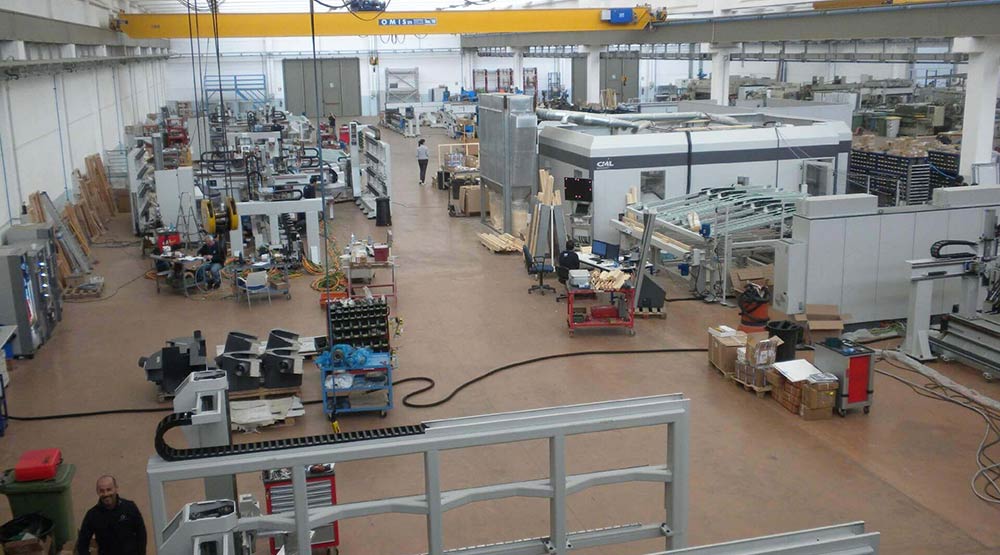interview for Xylon
How did you react to this emergency?
“First of all, by committing ourselves to analyzing the negative consequences that our society would have had to face based on the news provided by the media and by virological experts, epidemiologists etc…. the result of this effort of ours was unfortunately to have fallen into the deepest uncertainty. Each expressed different or even opposite opinions to those of the other. We found ourselves listening to statements such as: “we are ready!, it will be nothing more than a slightly stronger flu”, released at the beginning of the problem until “we know nothing about this new virus, let’s close everything”.
At this point we decided to get our own idea of what was happening, thinking about safeguarding the most important and vital values for our company. It may seem too commonplace but first of all we have secured the human heritage represented by all our employees, adopting all the safest procedures and protocols for their health. In fact, it is thanks to them and their high technical preparation that our company today finds itself recognized by the most important global groups producing wooden frames as the ideal and reliable supplier of extremely high-tech lines and machining centres. Immediately afterwards we assessed our state of health from both a financial and economic point of view, with particular attention to cash flows and the portfolio of orders already acquired and in the process of being acquired. The result was very comforting to us. We have therefore replanned production, taking into account the suspensions of activities imposed by the authorities, defining the possible recoveries when the activity reopens with the aim of being able to respect the delivery dates of the lines and work centers”.
What, in your opinion, is changing or will change radically?
“The way we manage interpersonal relationships is certainly changing, both in private and working life. The two contexts, in addition to being modified and organized according to the health safety rules imposed by the relevant authorities, will suffer a much more serious negative impact on a psychological level, above all due to the insistent, biased and most often ill-informed action of the media. The older, simpler, less educated people, who represent the majority of the Italian population, will be those most affected. Entrepreneurs, for their part, will have to achieve a careful corporate reorganization aimed above all at creating a working environment that is perceived by employees, customers, suppliers, collaborators and all those who have relationships with the company itself ( the so-called “stakeholders”) as strongly reassuring, protecting and under control. All of this will obviously be easier for companies that are already well organized and modern, which will be able to go even further in adopting highly innovative working solutions, using the most up-to-date IT solutions and the most efficient and effective production procedures both in terms of protection of human resources and production yield.
All of this will obviously require a significant financial commitment. Unfortunately, the weakest and most marginal companies (quite a few in Italy today) will find themselves in difficulty.
Looking at the situation from a positive point of view, we will arrive at a situation that will produce a population of entrepreneurs who are better prepared and ready to compete in various markets in every part of the world.
Once the period of social alarm is over, which we fear could continue for more than a year and even after the discovery of a vaccine, everything that has been done, adopted, achieved by companies will not be lost, indeed it will be maintained as ” engine” of a more modern corporate organisation.
We fear that private life will take a long time to normalize, certainly due to the negative psychological impact following the high tensions that developed during the pandemic, but above all due to the fear of having to encounter other future and unknown pandemics resulting from the compromised ecological situation of our planet”.
What should the authorities and all of us do?
“In summary, a very simple thing: the authorities should make the right decisions and we should respect them! For this to happen, however, some situations must occur, first of all the in-depth knowledge of the problems that must be solved to which must be added a high and complete specific competence acquired in the field by those who will have to make the decisions and define the rules to be respected (in other words laws, decrees, ordinances and so on). People are normally well disposed to respect the provisions and consequent actions that they consider right and logical. They do not tolerate absurd, incomprehensible things managed by an oppressive bureaucracy that is ill-disposed towards them. It is therefore necessary that the authorities are authoritative and that the state apparatus is available to the citizens who pay for its maintenance. They need to work on streamlining procedures and place more trust in those who create jobs and profit; fundamental elements to achieve widespread well-being at all social levels. It is necessary that the functions of the state (legislative, executive, jurisdictional) are covered by trained, competent, deserving, authoritative and capable people.
The authorities need to think about implementing measures that produce positive effectiveness in the short, medium and long term. The measures themselves must be formulated in a simple, clear and precise way.
In this way it will be possible to tackle every type of problem, from pandemics to earthquakes, from economic to financial crises, to also achieve the re-foundation of a Europe based on just and egalitarian principles: monetary, fiscal, financial, jurisdictional, military, humanitarian… ( what a utopia right?)”.

